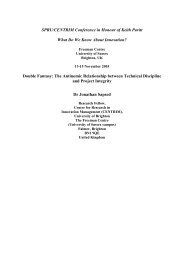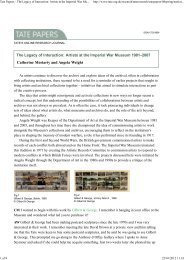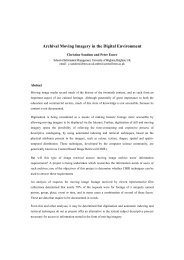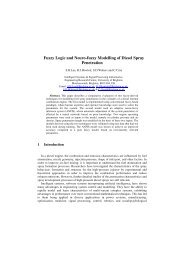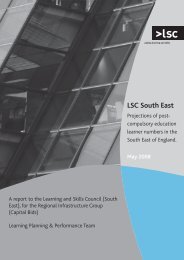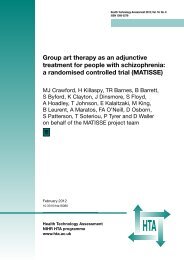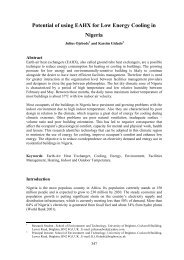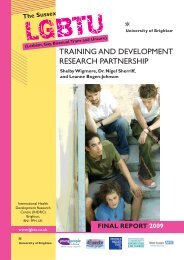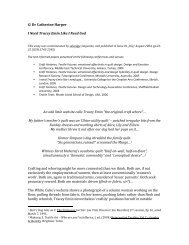TOP TIP - University of Brighton Repository
TOP TIP - University of Brighton Repository
TOP TIP - University of Brighton Repository
You also want an ePaper? Increase the reach of your titles
YUMPU automatically turns print PDFs into web optimized ePapers that Google loves.
Individual, Group, and Mixed Approaches<br />
infocus<br />
A number <strong>of</strong> projects and services we<br />
spoke to reported successfully using<br />
group based approaches in their work<br />
with young fathers. Amongst others,<br />
these include the Great Yarmouth<br />
Young Men’s Project, <strong>Brighton</strong> and<br />
Hove Young Fathers Project, Base 25<br />
in Wolverhampton, a fathers-to-be<br />
group in Berwick-upon-Tweed (run by<br />
a Northumberland midwife), Barrow<br />
Dads’ Group in Barrow-in-Furness,<br />
Boys2Men in London, T-BAG in<br />
Halifax, UKdadsposse and the<br />
Potential Project in Oxford, M.A.P in<br />
Norwich, and DVD in Rotherham.<br />
Whilst some <strong>of</strong> these projects use<br />
group work as their core approach<br />
(e.g. T-BAG), most <strong>of</strong> those listed<br />
above adopt more mixed models <strong>of</strong><br />
working in which group work is<br />
combined with more individualistic<br />
methods. Such mixed models can<br />
provide a great deal <strong>of</strong> flexibility in<br />
service delivery (see In Focus).<br />
34<br />
Using Group Approaches<br />
“It’s not that you can’t do an awful lot<br />
without running a group, but you can<br />
do an awful lot in a group.”<br />
[trainer from the YFP]<br />
TSA’s Young Fathers Project (YFP) - TSA’s<br />
YFP set out to develop, test, and evaluate an<br />
approach for working with young fathers who<br />
were either disengaged or socially excluded.<br />
The project was directed at young vulnerable<br />
fathers from different ethnic groups in urban<br />
Supporting Young Fathers<br />
and rural settings. Site locations included<br />
Birmingham (Top Dads), London (Newpin),<br />
Newcastle (Fathers Plus), Norwich (Mancr<strong>of</strong>t<br />
Advice Project), and Sheffield (Father Figures).<br />
Each site located within a host voluntary<br />
organisation, was expected to work with over<br />
50 young fathers aged under 25, <strong>of</strong> whom<br />
more than 15 would be teenagers, by<br />
developing a programme combining group<br />
work, one-to-one work, and peer support.<br />
The programmes were to help the young<br />
fathers consider their personal attitudes and<br />
behaviour as men and fathers, while improving<br />
their life skills and practical child care skills.<br />
Findings revealed a number <strong>of</strong> significant<br />
benefits to using group work in services for<br />
young fathers:<br />
• young fathers can develop confidence as a<br />
sense <strong>of</strong> security and relationships develop<br />
• peer support can be developed<br />
• young fathers are not totally dependent on<br />
the group leader<br />
• isolation <strong>of</strong> individual young fathers can be<br />
broken down<br />
infocus<br />
Mixed Models <strong>of</strong> Working<br />
Mancr<strong>of</strong>t Advice Project (M.A.P.),<br />
Norwich - M.A.P. currently works with young<br />
fathers through a mix <strong>of</strong> one-to-one work and<br />
group activities. It is a free independent<br />
information, advice, and counselling service<br />
for young people aged 11 to 25yrs. Provision<br />
includes a drop-in for young fathers, practical<br />
advice and information, skills development,<br />
and support for issues relating to being<br />
young men as well as young fathers. Other<br />
services include advice on housing, benefits<br />
and advocacy, a children and young peoples<br />
rights worker, a young fathers worker, free<br />
pregnancy testing, free condoms, a<br />
Connexions drop-in, and counselling service.<br />
Learning Points<br />
‘Our work combines the informality<br />
<strong>of</strong> a drop-in with the formality <strong>of</strong><br />
doing a focused group activity, it’s all<br />
combined in one so that the<br />
boundaries between the one-to-one<br />
• sometimes preferred by some young fathers<br />
over more intense one-to-one contact<br />
• group members can sometimes develop<br />
more quickly in a limited space <strong>of</strong> time<br />
• information can be delivered to many rather<br />
than individually.<br />
In addition, a number <strong>of</strong> key characteristics for<br />
successful group work with young fathers were<br />
evident including:<br />
• a critical number <strong>of</strong> core members need to<br />
be recruited to form a viable group<br />
• groups must be held at a convenient time,<br />
place, and venue accepting <strong>of</strong> the client<br />
group<br />
• group sessions should operate regularly each<br />
week or fortnight<br />
• promotion material should state whether<br />
children are welcome<br />
• groups should be monitored to avoid<br />
possible alienation and/or marginalisation <strong>of</strong><br />
individuals<br />
• groups should be run by at least two<br />
workers, a facilitator and a co-facilitator with<br />
suitable training and background.<br />
Contact: TSA, Tel +44 (0)1273 693311<br />
and group sessions become much<br />
more blurred.’<br />
• Group work can mean it is difficult to meet<br />
individual needs. Whilst some young<br />
fathers may be involved with their children<br />
and want to work on practical aspects <strong>of</strong><br />
parenting, others may have no contact and<br />
thus want to focus on very different issues.<br />
A mix <strong>of</strong> individual and group based<br />
approaches means workers are able to<br />
respond more flexibly to young fathers, by<br />
utilising the drop-in where one-to-one work<br />
can take place, but also conducting<br />
structured pieces <strong>of</strong> work with those that<br />
are in attendance (e.g. a group activity on<br />
parent craft or working on the production<br />
<strong>of</strong> a CD-ROM about being a father).<br />
• The youth work model is an effective way<br />
<strong>of</strong> delivering support for some young<br />
fathers. Moving between informal and<br />
more formal styles <strong>of</strong> working seems to<br />
suit the young men as opposed to more<br />
single structured approaches (e.g. such as<br />
a 6 week course).<br />
• M.A.P. has found that a mixed approach to<br />
young fathers work can help engage<br />
young fathers, as it is likely to be more<br />
suitable for greater numbers <strong>of</strong> young<br />
men. M.A.P currently works regularly with<br />
approximately 20 young fathers who attend<br />
the drop-in on a weekly basis.<br />
Contact: Andy Wood (Young Fathers<br />
Worker), Tel: +44 (0)1603 766 994



